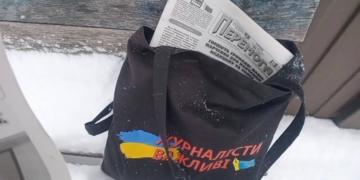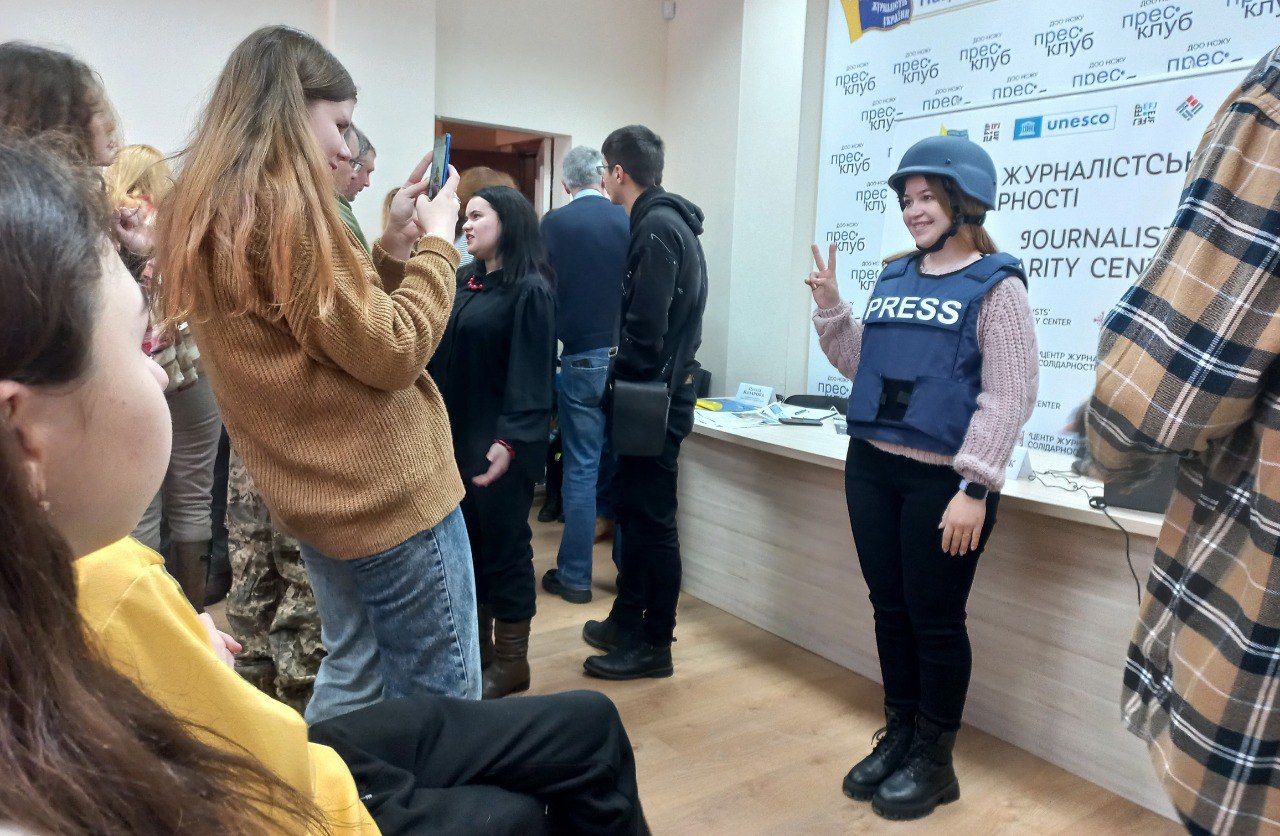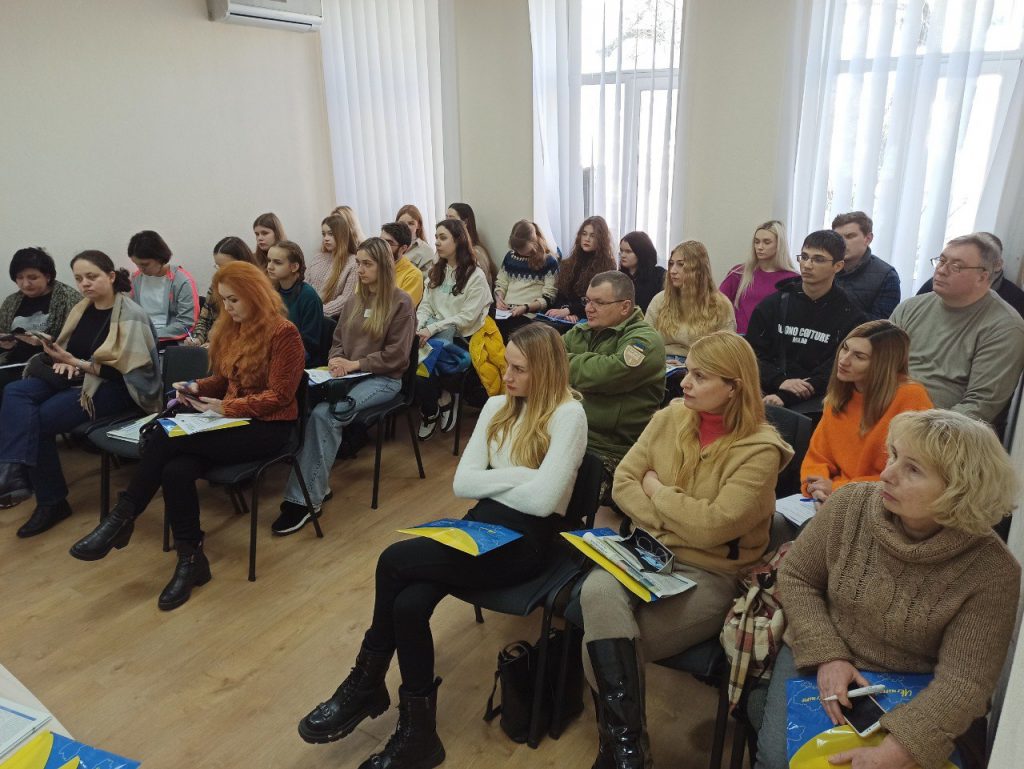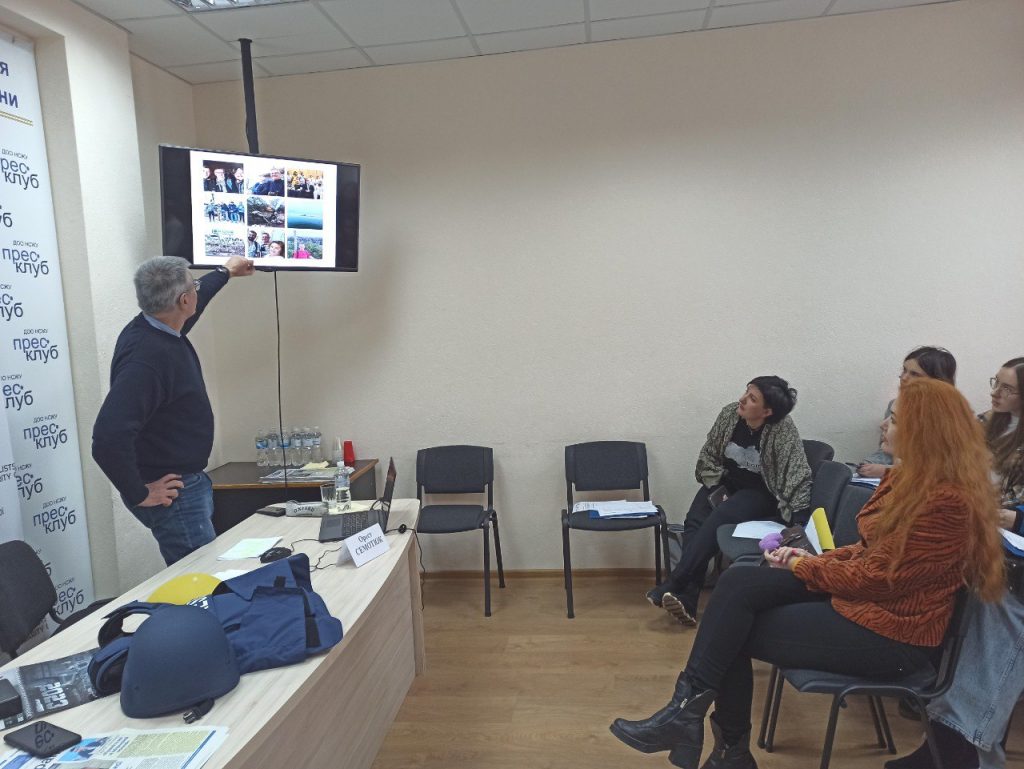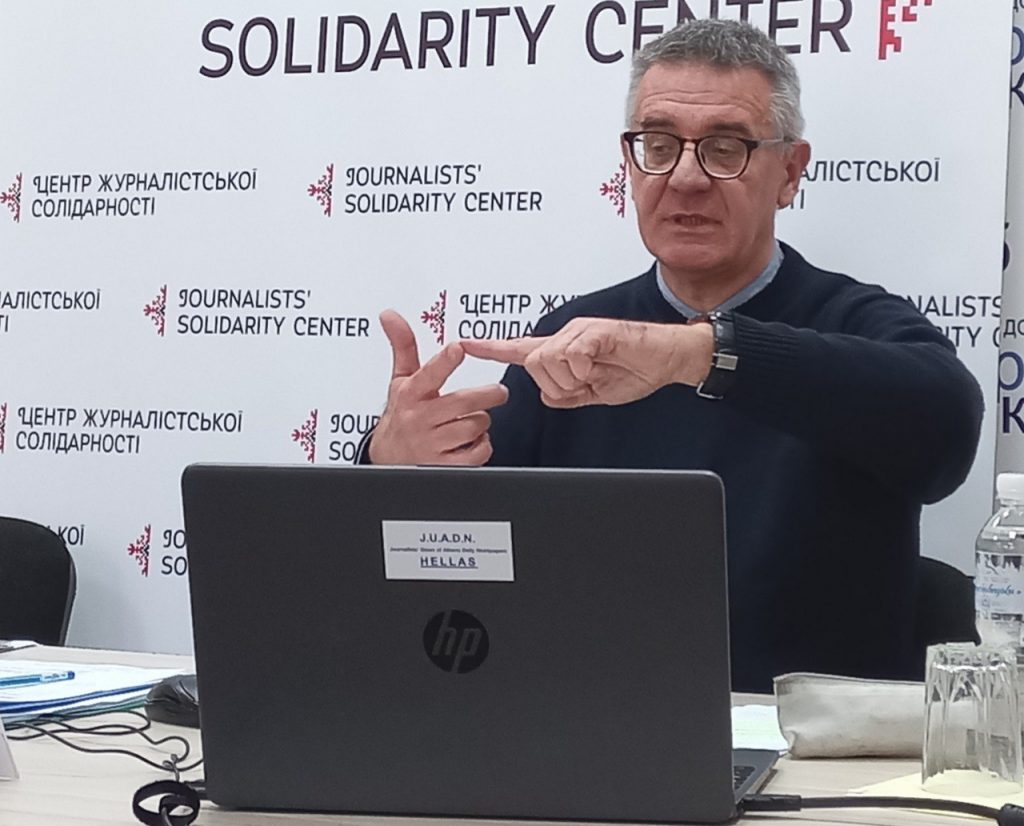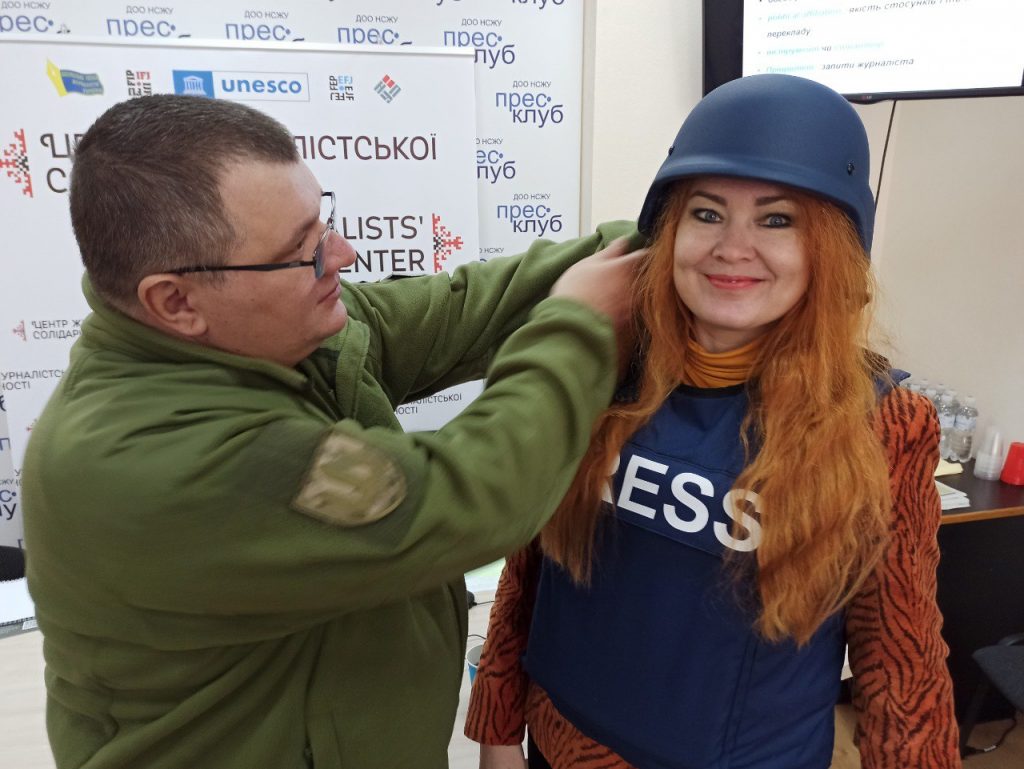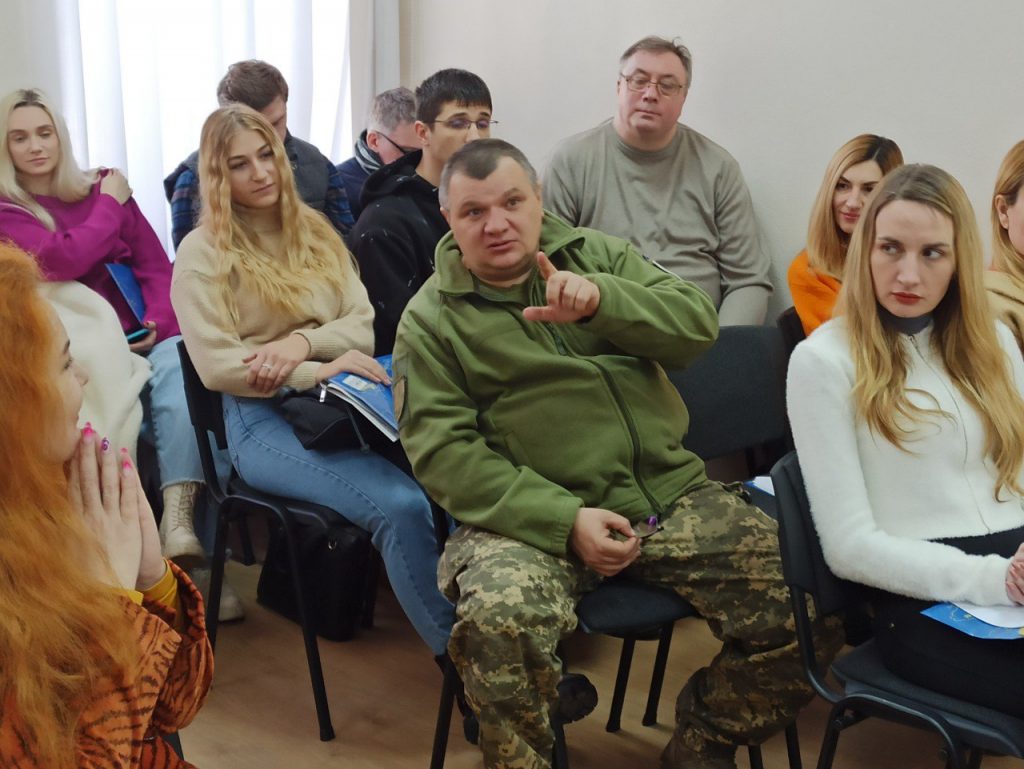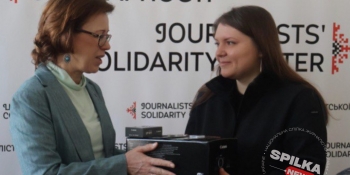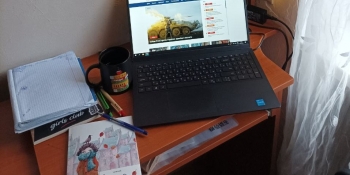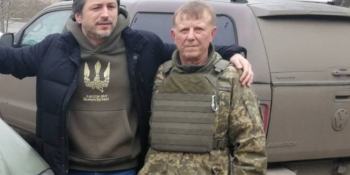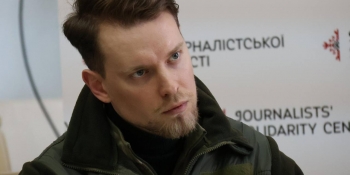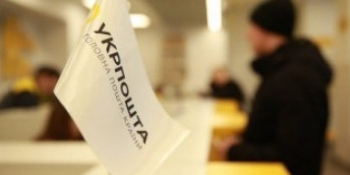Starting December 2022, the Pylyp Orlyk Institute for Democracy launched a series of master classes aimed at training fixers. The other day, the Dnipro Journalists’ Solidarity Center of the National Union of Journalists of Ukraine (NUJU) hosted the event. It was there that the master class entitled Ukrainian Fixers: Local Context and Global Challenges took place. Who are fixers and what is their mission? What does a fixer risk? What are the features of working in a combat zone? Experienced journalists, freelancers, teachers, students, and military correspondents tried to cover all these questions during the event.
“One of the fields of the Center’s activities is awareness support and the organization of educational events. That is why we became partners of the Pylyp Orlyk Institute for Democracy in holding a master class. The interest of the audience was confirmed: media workers from the Dnipropetrovsk Region found the topic interesting, relevant and extremely important,” noted the coordinator of the Center Natalia Nazarova.
Fixing means to fix
The master class for the Dnipro audience was conducted by Orest Semotiuk, an expert of the Lviv expert group of the Pylyp Orlyk Institute for Democracy. He is a person with considerable experience and knowledge. He has been working as a fixer since 2016. Its partners included publications such as ZEIT, Spiegel, Volkskrant, Al Jazeera, Weltwoche, and Frankfurter Allgemeine.
According to Orest Semotiuk, fixing is not a new phenomenon in the media space of Ukraine. However, until February 24, 2022, the meaning of this word was known to a narrow circle of journalists. Fixer is a person who fixes something. Usually, the services are used by those who do not have the necessary contacts to cover the topic of the visit, do not know the language of the country of the business trip, etc. Today, in Ukraine, the services of fixers are actively needed by foreign mass media that come to the country to cover military operations and crimes against the civilian population.
“With the beginning of Russia’s full”scale aggression, Ukraine became the #1 topic in the world media, many of which sent their correspondents and photographers here. Channels, groups, and chats appeared on social networks, the participants of which were not only journalists, photographers, media experts and media researchers, but also people who had no relation to the media or international politics, but had a more or less decent command of a foreign language and basic organizational skills,” noted Orest Semotiuk.
What is the function of fixers? These are conceptualization, logistics, translation, protection and security of media representatives, communication with potential heroes of materials, search for approaches to communication with representatives of various structures, etc. That is, fixers seem to “take care” of journalists, cameramen and other members of film crews during their stay in the war zone.
Trust as a key ingredient
Of course, such tasks require a high level of professionalism and a responsible approach from a fixer. It largely depends on what final information citizens will receive, how constructive the dialogue between journalists and speakers will be, whether the publications will contain facts and not stereotypes, whether professional experts will be involved in commenting. Therefore, journalists are often in great demand among fixers.
“Journalists are the most experienced and reliable fixers. Significant social capital and professional experience make them a valuable source for finding stories, preparing, and analyzing material for receiving news and convincing analysis of the availability of certain materials,” the expert emphasized.
In addition, even an experienced journalist must evaluate their capabilities as a fixer, separate political preferences from work issues. An important aspect is the fixer’s knowledge of a foreign language to help the translator convey reliable information.
“If a journalist goes to the military, it is not just knowledge of the English language that is needed, but an understanding of the intricacies of military terminology. Know how to say tank in English and how to say armored car. Know all abbreviations used in NATO standards. Yes, once, due to the unprofessionalism of the translator, the OSCE mission was almost given incorrect information about the number of enemy tanks in the positions,” notes Colonel Taras Gren, a special correspondent of the news agency of the Ministry of Defense ArmiyaInform.
Despite the fact that a large number of fixers advertise their services through social networks and professional forums, most of them receive orders thanks to oral recommendations, personal contacts and experience. Trust here becomes a key ingredient in building relationships, legitimizes the activity of the fixer in the eyes of the journalist and vice versa.
Safety and not just it
The second block of the training was dedicated to safety in fixing. Most journalists’ teams do not include a security manager for financial reasons. Then the fixer, along with the task of finding and checking information about safe routes for trips in Ukraine, receives a protective helmet and a bulletproof vest.
“Our fixers must understand that when they go to a hot spot, they are to some extent responsible for the journalists they accompany. In hot spots, we can always become targets for the enemy. After all, as experience shows, the ruscists deliberately aim at journalists and fixers. “Sometimes the inscription of the press on the bulletproof vest does not protect, but instead makes the enemy fire,” emphasized Orest Semotiuk.
For media workers of the Dnipropetrovsk Region, the topic of fixing sounded in a new way.
“I was familiar with the topic of fixing before, but superficially, I didn’t really delve into it. Therefore, today, first of all, I received new information. And secondly, this knowledge was shared by an expert of such a high level. Communication with Orest is fascinating. This is not a monologue, but a lively conversation, an exchange of ideas. Such measures are absolutely necessary for students. In the current conditions, I understand their importance and irreplaceability. It’s no secret that studying at the university takes place online, and live communication with teachers is limited. Moreover, teachers do not have experience in fixing. That’s why I got such information not within the walls of the university, but at the Dnipro Journalists’ Solidarity Center,” says Dariya Pohudo, a student-journalist of the University of Customs and Finance, sharing her impressions of the training.
As earlier reported, the Journalists’ Solidarity Centers are an initiative of the National Union of Journalists of Ukraine (NUJU) implemented with the support of the International and European Federations of Journalists, as well as UNESCO. They are designed to help media representatives working in Ukraine during the war. The Centers operate in Kyiv, Lviv, Ivano-Frankivsk, Chernivtsi, Zaporizhzhia, Dnipro and provide journalists with organizational, technical, legal, psychological and other types of assistance.
Contact number of the Journalists’ Solidarity Center in Dnipro us 050 919 8479 (Natalia Nazarova, the coordinator of the Dnipro Center). The Center is located at 6, Starokozatska Street.
UNESCO is the United Nations Educational, Scientific and Cultural Organization. It contributes to peace and security by promoting international cooperation in education, sciences, culture, communication and information. UNESCO promotes knowledge sharing and the free flow of ideas to accelerate mutual understanding. It is the coordinator of the UN Action Plan on the Safety of Journalists and the Issue of Impunity, which aims to create a free and safe environment for journalists and media workers, thus strengthening peace, democracy, and sustainable development worldwide. UNESCO is working closely with its partner organizations in Ukraine to provide support to journalists on the ground.
The designations employed and the presentation of material throughout this digest do not imply the expression of any opinion whatsoever on the part of UNESCO concerning the legal status of any country, territory, city or area or its authorities, or concerning the delimitation of its frontiers or boundaries. The authors are responsible for the choice and the presentation of the facts contained in this digest and for the opinions expressed therein, which are not necessarily those of UNESCO and do not commit the Organization.
About UNESCO
UNESCO is the United Nations Educational, Scientific and Cultural Organization. It contributes to peace and security by promoting international cooperation in education, sciences, culture, communication and information. UNESCO promotes knowledge sharing and the free flow of ideas to accelerate mutual understanding. It is the coordinator of the UN Plan of Action on the Safety of Journalists and the Issue of Impunity, which aims to create a free and safe environment for journalists and media workers, thus strengthening peace, democracy and sustainable development worldwide. UNESCO is working closely with its partner organizations in Ukraine to provide support to journalists on the ground.
The designations employed and the presentation of material throughout this publication do not imply the expression of any opinion whatsoever on the part of UNESCO concerning the legal status of any country, territory, city or area or its authorities, or concerning the delimitation of its frontiers or boundaries.
The author is responsible for the choice and the presentation of the facts contained in this publication and for the opinions expressed therein, which are not necessarily those of UNESCO and do not commit the Organization.





